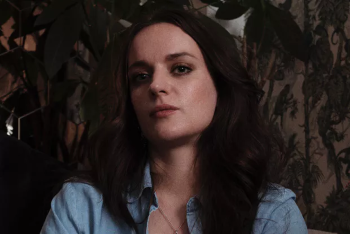University News Last updated 27 September 2024

“Poetry is a way of hearing yourself without interruption” - Poet Hayley Frances spoke to Lucy Farrington-Smith ahead of her debut collection launch, Administer the Laughing Gas, at Royal Birmingham Conservatoire.
I asked poet Hayley Frances to introduce her debut collection with one adjective. She gave me three: “Sorry, but it is my job to break the rules to find my voice”.
The adjectives–Honest. Raw. Ceremonial–capture not just her poetry collection, Administer the Laughing Gas, but her interview, too, sharing intimate details of her craft, how she views poetry as creative therapy, and an exclusive excerpt from her collection.
Beginnings
Drawn in by the collection’s title, I wanted to discuss the juxtaposition of the heavy, emotional subject matter–an unfiltered documentation of a bereaved mother's survival–with the colloquial use of “laughing gas”.
“I like the play on words and meaning”, Hayley says. “Grief anaesthetises us, Social Media anaesthetises us, Life does too. It's a metaphor as much as it is a treatment, a reality”.
She continues, sharing a few lines from her collection:
"and peace sets in
as if they have the answers
for why we exist and there it is
when they empty their lungs
of silver gas and air there it is
the first breath before the first cry
their heart flickers and they resist
until it threatens to blow out
as the oxygen fades..."
“Birth, life, breath, spirit, body, grief, motherhood, and loss are being understood and translated through the poems. There is a loss of mind, or a coming to the mind, or a focusing on the body, or a focusing on relief, or an escape from pain through the Administration of Laughing Gas during childbirth, so it makes sense and is the only title right for the poems”.
Therapy
Carl Sandburg once said, "Poetry is an echo, asking a shadow to dance", something which Hayley mirrors in her own musings.
“Poetry is a way of hearing yourself without interruption. Its craft and form offer a safe boundary to express yourself in”. Interested in the therapeutic benefits of creative writing, both for the writer and the reader, I asked for more detail. “For me, the poem, or writing, is the expression, but the understanding and therapeutic benefit comes in reflecting and interpreting the poem”.
“The poem is a container for those moments, experiences, relationships, and/or emotions that are difficult or restricting; those you can't quite articulate in conversation, or you don't fully understand. Poetry, art, music - whatever it is, there's a story we relate to, a shared experience and it's in that witness, in that telling that we find solace and relief”.
Conversation
At the collection’s launch, French multi-instrumentalist Yoav Yo, sound therapist Chris Richardson, and a chorus of female poets will weave a ceremonial soundscape around Hayley’s hallucinogenic and meditative poems.
“I find poetry is a hard sell if you're not a poet or engaged in the arts in some way”, Hayley said. “I hope the music assists in the softening between the audience and me so I am, for want of a better word, hopeful there's a dialogue around the use of alternative music with poetry”.
Hayley is also the assistant director for the VERVE Poetry Festival, an event that seeks to encourage dialogue. I asked if she thought her experimental delivery was primed to do the same.
“We can't control what people talk about or how people receive the work we create. What I imagine is a recognition or deeper connection to the importance of grief tending and expression”.
Form
When you think of poetry, you’re likely to recall the rhythmic meter synonymous with Shakespeare’s sonnets–but when asked if she prefers meter (the pattern of beats and rhythmic structure) or the tumbling, shape-shifting nature of free-form poetry (with no set rhyme or meter), Hayley says she prefers the latter.
“But there's always consonance, internal rhyme, metaphor, dialogue”. She continues: “I like repeating words and turning them on their meaning, breaking them up, framing them in all their meanings and using them to really express an idea”.
Awakening
At its heart, Hayley’s collection is described as the beginning of an awakening that presents the reality of loss through poems. “It's such a cathartic practice”. She concludes: “Something is released when you witness it. No matter how hard you try to hide what you don't want to feel or go through, even if you don't understand the poem, you will find yourself there. You will always find a part of you that needs attention”.
–
You can hear Hayley’s debut poetry collection, Administer the Laughing Gas, at Royal Birmingham Conservatoire on Sun 6 Oct, 7pm - 8:30pm.
Tickets are available here.